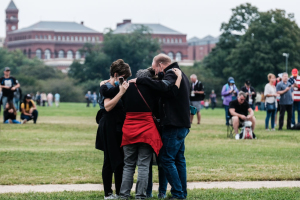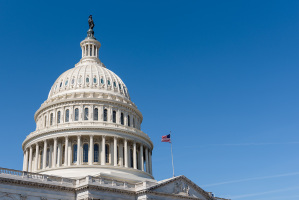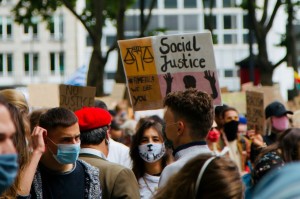Why We Must Stop the Gov't From Outlawing the Ex-Gay Movement

Carys Moseley shows that banning the ex-gay movement would be a form of tyranny and urges the government to step away from any plans to outlaw it.
The Home Office has allegedly told the LGBT website Pink News that it wants to look again at the possibility of banning psychotherapy for unwanted same-sex attraction, which it disparagingly terms 'conversion therapy'. It says there was a question asked about it in the government's LGBT survey conducted in 2017. The Home Office has said that the government is currently studying the responses to the survey and that it will publish a response later this year.
However, the government stated last year that it does not believe creating a criminal offence is right. This was in response to a petition by a gay journalist called Josh Parry, who attacked an African church in the Liverpool area helping people with unwanted same-sex attraction. Soon after the initial screening of Voices of the Silenced in London last month, after pressure by gay activists to have it cancelled, the government said that it was keeping the matter under review. Is this a coincidence, and what does all this mean?
Fifty years on from the Wolfenden Report
In 1954 Sir David Maxwell-Fyfe, the Conservative Home Secretary, commissioned Sir John Wolfenden, Vice-Chancellor of the University of Reading, to head a committee to report on homosexual offences. The background to the report was concern that gay civil servants might risk being blackmailed by the Soviet Union. This was because several British spies who were homosexual or bisexual had become traitors by going over to the Soviets in 1951 - Guy Burgess and Donald MacLean. In other words, at the height of the Cold War, male homosexuality was considered a serious security risk. When the Wolfenden Report was published in 1954 the government did not accept its recommendation to decriminalise homosexuality. It later transpired that Wolfenden's son Jeremy was gay, and that he was a spy for MI6 who was then compromised by the KGB.
The Report's recommendations eventually became law in 1967 as the Labour government of Harold Wilson supported the Sexual Offences Act, a private member's bill tabled by MP Leo Abse. Many people have considered this law a compromise which focused on the right to privacy and freedom of speech. But since then, relentless gay rights campaigning has eroded the freedom of speech of those who disapprove of homosexual activity, and the right to private life of those who wish to move away from homosexuality with the help of therapy.
Today, forced celebration of homosexuality is promoted by the entire government and public sector, bankrolled by big corporations and punished by loss of employment, blacklisting and bullying in the press and social media. Yet the political context and the nature of the security threats to the United Kingdom have changed somewhat. Now the main designated enemy is 'extremism' - mostly but not exclusively Islamist extremism. As has been said many times before, there is a risk to Christians here.
Is therapy for unwanted same-sex attraction 'non-violent extremism'?
On 19 October 2015 the government published the Counter-Extremism Strategy, which invented a history of the development of 'British Values' which goes as follows:
'Our values are not exclusive to Britain, nor have they been arrived at by accident, or imposed from above. They have been shaped by our history. Our acceptance of the freedom of religious choice was born of religious conflict, which taught us that the alternative to tolerance is violence and bloodshed. Our support for democracy developed over centuries as a guard against the abuse of power. Our belief in equality followed a history in which we have seen injustice, misery and damage caused by discrimination on the basis of religion, race, gender, disability or sexual orientation.'
The impression given here is that LGBT rights are the pinnacle of a long march to freedom and democracy in British history, and that they symbolise these things.
Speaking at the Pink News Awards on 27 October 2015, Nicky Morgan, the then Education Secretary, demanded that 'gay cure therapy', as she calls it, should be stamped out. In the same breath she said that the Prime Minister promised to 'do more to tackle...non-violent extremism that encourages intolerance and hatred towards LGBT people.'
It is highly relevant that the UK is the only western country to have seriously considered passing a Counter-Extremism Bill to restrict free speech and freedom of assembly on grounds of 'extremism'. This was first proposed back in May 2015, and a Counter-Extremism and Safeguarding Bill was promised in the Queen's Speech in 2016. That Bill was quietly dropped in January 2017 because it was impossible to invent a legally acceptable definition of 'extremism'. Sensible people had been warning against the Bill all along. No one less than Jonathan Evans, former Director General of MI5, had warned that it could be misused to target evangelical Christian street preachers. This is relevant because a lot of the targeting of street preachers has been precisely because they preach against homosexual activity. More recently a Christian teacher was reported under the Prevent Duty for telling a lesbian student 'God loves you'.
From Russia with hate speech and anti-extremism laws
It is vital to realise that laws against 'extremism' are newer versions of hate speech laws. The country that has led the way in this respect is Russia. It was the Soviet Union that pushed the idea of hate speech legislation at the United Nations, in order to restrict freedom of speech under the Universal Declaration of Human Rights of 1948. At the time the United Kingdom resisted the Soviet proposals and defended free speech. Now we have hate speech laws and the concept of 'extremism' being used in public policy and the courts.
Under its current President Russia has an anti-extremism law, and what is deemed 'extreme activity' need not include threats or acts of violence. This law has been used against evangelical and Pentecostal Christians. This month, American human rights expert Evelina U. Ochab, who is an UN expert on persecuted Christians, drew a parallel between the Russian anti-extremism law and the UK Counter-Extremism Strategy which targets 'non-violent extremism'.
It was the Conservative governments of David Cameron and Theresa May that proposed a Counter-Extremism Bill. It is also the case that under these two prime ministers the Conservative Party has received major donations from Russian donors since 2010. It is during this time that the Conservatives came round to the idea of same-sex marriage, with Theresa May the biggest cheerleader, and it was they and not the Liberal Democrats who pushed for a Counter-Extremism Bill. Has the Conservative Party really learnt any lessons from the debates over the Wolfenden Report and the Sexual Offences Act 1967?
The Home Office is exceeding its remit
It speaks volumes for the illiberal and frankly sinister attitude of this government that it is the Home Office that should get involved in an attempt to outlaw a particular type of therapy. This is undoubtedly because Amber Rudd has inherited the Women and Equalities portfolio from Justine Greening. At the same time it is also relevant that Baroness Williams of Trafford, the Minister for Equalities, is also the Minister for Counter-Extremism.
The job of the Home Office is to deal with actual crime, of which there is plenty already, not to deal with mental health and psychotherapy. It is exceeding its remit as a government department in this respect. Having said that, given that the Home Office is responsible for hate crime, it is reasonable to suggest that the intention is to make therapy for unwanted same-sex attraction a hate crime. This fits perfectly with the fact that hate crime laws and anti-extremism laws are really the same thing. The Home Office needs to be reminded that outlawing psychotherapy is not part of its Single Departmental Plan for 2015-2020 (a new version of which was published in December 2017), nor was it in the Conservative Party manifesto at the last general election.
Government researchers selectively misinterpret research on therapy
On 23 July 2017 the Government Equalities Office announced an LGBT survey open to the general public. The reason given for that survey was that the evidence on inequalities faced by LGBT people in the UK was too patchy, according to a report published in July 2016 by the National Institute for Economic and Social Research. That report cited the paper from 2009 which surveyed UK mental health professionals to find out what proportion had been approached by clients unhappy with same-sex attraction. I discussed the findings of that paper in my previous article on the ex-gay movement.
The government-supported researchers in 2016 ignored the finding that the 2009 paper's authors reluctantly reported, namely that most mental health professionals who had seen such clients believed therapy for lessening unwanted same-sex attraction should be available to them. Instead the government researchers only cited the fact that four percent of mental health professionals would themselves help a client in this manner. This made it look as if far fewer mental health professionals supported the availability of therapy than actually did.
Most people want politicians to be free to say gay sex is sinful
In April 2017 a ComRes poll found that most people in Britain supported a politician's right to say that gay sex is sinful. This was in response to the attacks on Tim Farron for vacillating on the issue. The majority extended to people of all ages. Interestingly 62% of people aged 18-24 agreed, with the lowest percentage being 59% of those aged 25-34.
This is all very interesting because a few years earlier, in 2011/2012, the third wave of National Survey of Sexual Attitudes and Lifestyles found that 50% of people then aged 16-24 thought that male same-sex partnerships were 'not wrong at all'. The rest clearly thought they were sometimes or always wrong. The percentage was lower for all other age groups.
These two surveys suggest that most people do not think that same-sex partnerships are 'not wrong at all' and that most people want politicians to be free to say that gay sex is sinful. People want members of all professions, including politicians, to tell the truth. This clearly shows that the public will not tolerate censorship of views critical of homosexual activity. In this respect ordinary people clash with LGBT activists and those in government who want to outlaw the ex-gay movement.
Faced with public opinion on homosexuality being so mixed, and with most people in a survey in 2014 saying they supported a man married to a woman being allowed therapy, why are LGBT activists in government still determined to outlaw it?
Is there something to hide about same-sex marriage?
Last year, the Office of National Statistics conducted a little-noticed consultation asking the public if they wanted population estimates on same-sex marriage to continue to be published or to be merged with those for heterosexual marriage. This was a bizarre idea given that the Coalition government and LGBT groups had campaigned so hard to legislate for same-sex marriage, and that same-sex marriage is a protected characteristic under anti-discrimination law. Why suddenly decide that the estimates for the stock of people in the different types of marriage should no longer be made?
The list of respondents to the consultation shows that not one major LGBT campaign group bothered responding to it (though the Government Equalities Office did). Most organisations responding were churches, for the obvious reason that they wanted to scrutinise marriage policy in general, and that maintaining the status quo was necessary for maintaining data quality, accuracy and transparency.
Many gays and lesbians are in opposite-sex marriages
Despite the advent of same-sex marriage, official estimates for England and Wales suggest that more gays and lesbians are married to members of the opposite sex than are in same-sex marriages. This extraordinary finding comes from the Sexual Identity questions in the Annual Population Survey conducted annually between 2012 and 2016. These estimates need to be handled with care due to their wide margin of error. Nevertheless they appear to indicate a pattern that repays closer attention as it complicates our picture of marriage and sexual identity.
The Survey estimates that since 2014, the first year of same-sex marriage, the number of gays and lesbians who are in heterosexual marriages may have been as high as 24,000 in 2014 and in 2016 as high as 31,000. The same year 29,000 gay and lesbian people were estimated to be in same-sex marriages.
This extraordinary finding has never once been mentioned by the government or LGBT activists. Gay activists both inside and outside government undoubtedly know very well about this. It is clearly something that they want to stay hidden in plain sight. It is clear that the Core Issues Trust poll from 2014 addressed the situation of the potentially thousands of people with a gay or lesbian sexual identity who are in opposite-sex marriages.
Upholding personal freedom and marital commitment
One of the reasons that some people seek out therapy is that they have made a marriage commitment to someone of the opposite sex 'forsaking exclusion all others', and their unwanted same-sex attraction gets in the way of this goal.
Successive waves of the National Survey of Sexual Attitudes and Lifestyles conducted in 1991, 2001 and 2011 also clearly show that most people who have ever experienced same-sex attraction or had same-sex experiences subsequently move away from homosexuality and do not identify as gay or lesbian. This would make sense of the rise in the number of clients presenting for therapy due to confusion over sexual orientation since 1991.
Several fundamental freedoms are at stake here. These include the right to respect for private and family life under Article 8 of the European Convention of Human Rights. Related to this is the right to marry and found a family under Article 12. Then there is the freedom of expression for both individual clients and therapists, under Article 10. Related to this is the freedom of thought, conscience and religion under Article 9, and the freedom of assembly under Article 11 which would include conferences, training events and suchlike.
How dare gay activists try to control ex-gays
It simply isn't up to people whose sexual identity is LGB to deny other people's desire to move away from same-sex attraction. Gay activists do not own everybody else who experiences same-sex attraction. They do not have the moral right to dictate to them how they handle their sexual feelings, their self-image, their bodies or their marriages.
To put it more starkly, many ex-gays who have received therapy are married to members of the opposite sex and have children. How dare gay activists talk in a way that undermines these people's right to respect for private and family life and even their right to marry! How dare gay activists demand the outlawing of the therapy that helped these ex-gays in life, just because the thought of it makes them feel uneasy! This is the very essence of tyranny across the entire history of political theory, to order public policy entirely around the desire of a few individuals at the expense of the common good.
The government has no mandate to outlaw the ex-gay movement
It is overstepping so many basic rights and fundamental freedoms in an outrageous manner. It is going against the best evidence on public opinion, and worst of all it looks as if it is ready to brand decent, upright citizens as extremists guilty of hate speech. There must be swift action against ministers and civil servants who overstep their remit in this manner, and a return to civility and respect for individual liberties, freedom of speech and the right to respect for private and family life for all British citizens. We must hear no more of this arrogant tyrannical totalitarianism about outlawing the ex-gay movement from this or any future government of the United Kingdom.
Originally posted at christianconcern.com




























